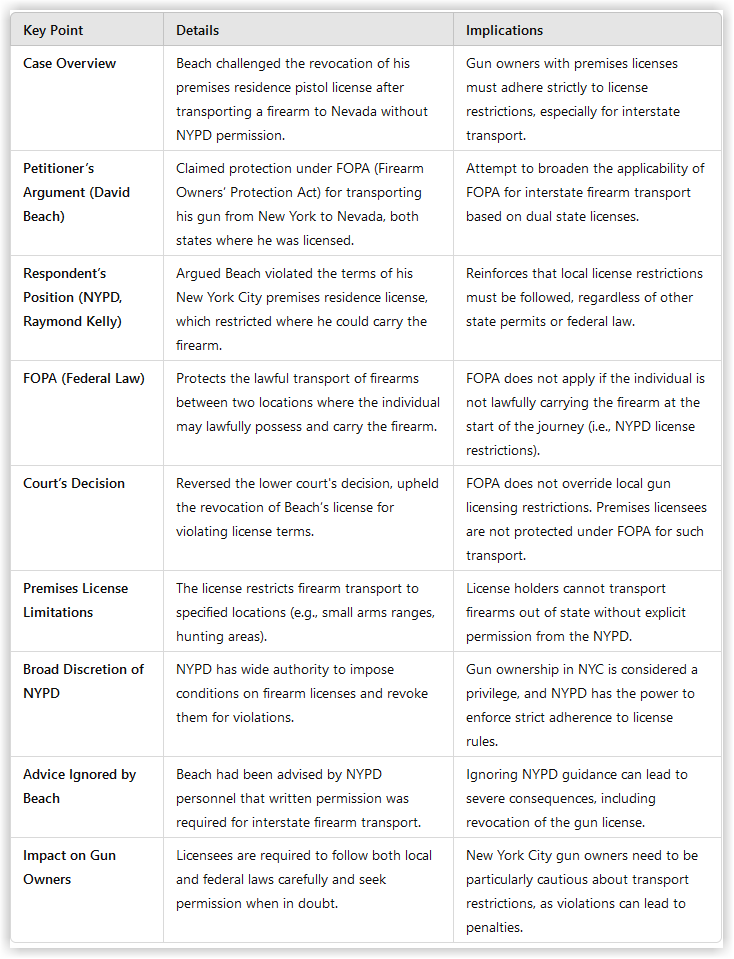Understanding the Case and Its Implications for Firearm Transport
The Matter of Beach v. Kelly is a 2008 legal case decided by the Appellate Division, First Department of New York, which addresses the limits of a New York City premises residence pistol license and its interplay with federal firearm transportation laws. This case highlights the conflict between local licensing restrictions and the federal Firearm Owners’ Protection Act (FOPA), particularly regarding the transportation of firearms across state lines.
Case Overview
In Beach v. Kelly, the petitioner, David Beach, held a New York City premises residence pistol permit. This type of license restricts gun owners to possessing a firearm at their residence and allows limited transport to specific locations, such as small arms ranges, shooting clubs, or authorized hunting areas. However, Beach took his handgun to Nevada to attend a gun convention, which exceeded the terms of his license. As a result, the New York City Police Department (NYPD), represented by Police Commissioner Raymond Kelly, revoked Beach’s license.
Beach challenged the revocation, arguing that under FOPA, he was entitled to transport his firearm between states where he was legally permitted to possess it—New York and Nevada. FOPA allows individuals to transport firearms for lawful purposes across state lines, provided the firearm is legal in both the departure and destination states. Beach believed that since he was licensed to carry in both states, his actions were protected by FOPA.
Key Legal Issues
The case hinges on two major legal questions:
- Local License Restrictions vs. Federal Law:
Beach argued that FOPA, a federal law, superseded the local restrictions of his premises residence license. FOPA allows individuals to transport firearms across state lines if they are lawfully allowed to possess the gun in both the starting and ending locations of their journey. Beach interpreted this to mean that his New York license, combined with his Nevada gun license, protected his transportation of the firearm across state lines. - Scope of New York City’s Premises License:
The NYPD argued that Beach had violated the specific terms of his premises residence license, which allowed him to carry his firearm only to small arms ranges, shooting clubs, or authorized hunting areas within New York. The NYPD claimed that transporting the firearm to Nevada was not permitted without prior written authorization, which Beach had been explicitly advised to obtain but disregarded.
Court Decision
The New York County Supreme Court initially sided with Beach, annulling the revocation and reinstating his license. However, the Appellate Division reversed this decision, reinstating the revocation of Beach’s license.
The court’s reasoning was based on the limited scope of the New York City premises residence license. The court found that, while FOPA does protect the interstate transportation of firearms under certain circumstances, Beach’s situation did not meet the requirements. Specifically, the court noted that FOPA applies only when the individual is lawfully permitted to “possess and carry” the firearm at both the beginning and end of the journey. The premises residence license did not allow Beach to lawfully carry the firearm outside of specific local conditions (e.g., to a range or hunting ground), so he was not lawfully carrying the gun at the inception of his trip to Nevada. Therefore, FOPA did not apply.
Moreover, Beach admitted during an administrative hearing that he had been informed by NYPD License Division personnel that he needed written permission to transport the firearm to Nevada. Despite this advice, Beach proceeded with the trip, leading the court to conclude that the revocation of his license was neither arbitrary nor capricious.
Implications of the Ruling
The court’s ruling in Beach v. Kelly has significant implications for New York City gun owners with premises residence licenses:
- FOPA’s Limited Protection:
This case clarifies that FOPA’s “safe passage” provision does not automatically apply to holders of New York City premises residence licenses. Such licenses restrict firearm possession to the home and specific locations within the state, meaning that licensees are not considered to be lawfully carrying firearms at the beginning of an interstate journey. As a result, they are not protected by FOPA when transporting firearms across state lines unless they obtain explicit permission from the NYPD. - License Restrictions:
The ruling emphasizes that a New York City premises residence license is a privilege, not an absolute right. The NYPD has broad discretion in imposing and enforcing conditions on firearm licenses, including revoking licenses when terms are violated. Individuals holding these licenses must strictly adhere to the limitations set forth by the NYPD, especially regarding the transport of firearms. - Need for Written Permission:
For individuals seeking to transport firearms out of state, this case reinforces the importance of obtaining written permission from the NYPD. The failure to do so, even if the gun owner believes they are protected under federal law, can result in license suspension or revocation.

The Matter of Beach v. Kelly is a key case for understanding the limits of federal firearm transportation protections, especially as they relate to local gun licensing laws. For New York City gun owners, the case serves as a reminder that premises residence licenses carry strict limitations, and the federal FOPA law cannot be used to circumvent those restrictions without explicit authorization. As always, understanding both local and federal firearm regulations is crucial for responsible gun ownership.



